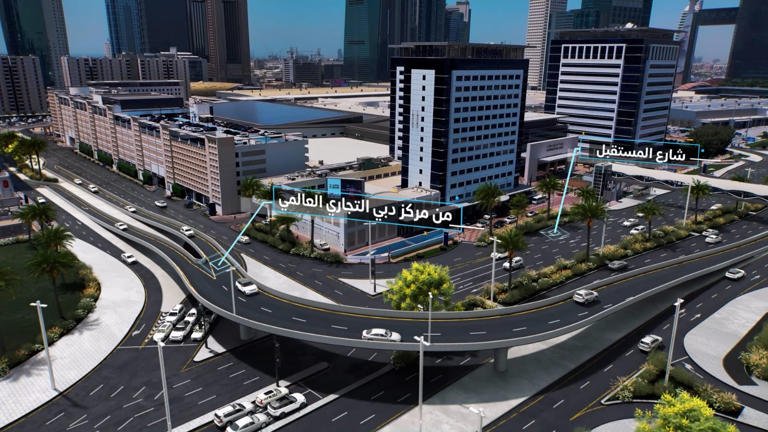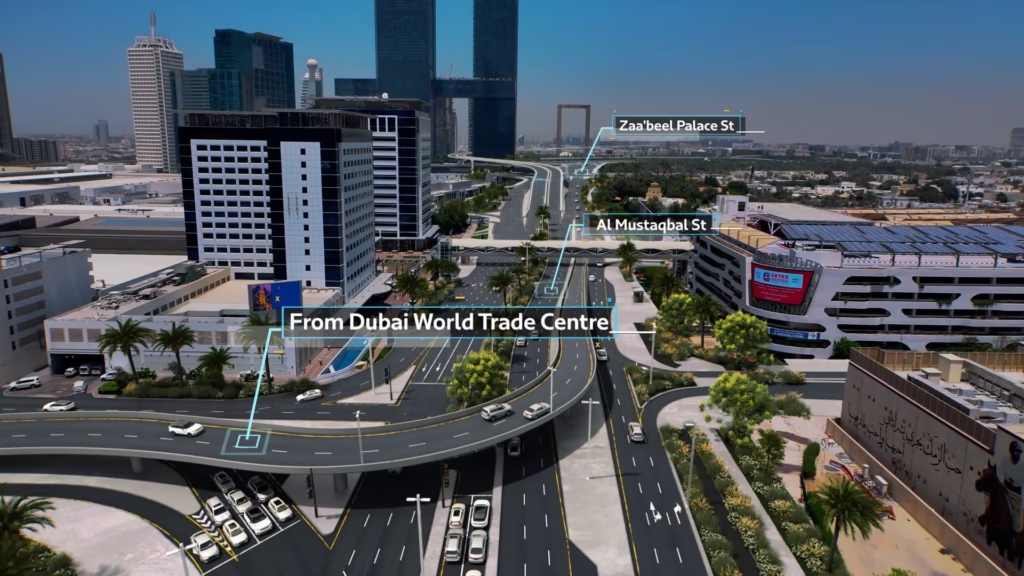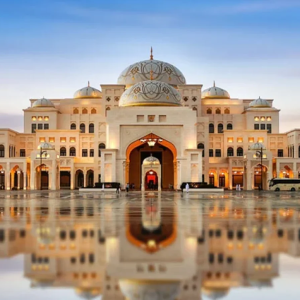The Al Mustaqbal Street Development project has taken a major step forward as Dubai’s Roads and Transport Authority (RTA) officially awarded the contract to begin construction. This project marks a significant stride in improving infrastructure in one of Dubai’s most dynamic and densely populated areas, including Downtown Dubai and Business Bay.
By enhancing mobility, easing congestion, and providing smart infrastructure solutions, the development is expected to have a lasting impact on the city’s transportation network and urban landscape.
Why Al Mustaqbal Street Matters
Located in the heart of Dubai, Al Mustaqbal Street is a crucial corridor linking key areas such as Sheikh Zayed Road, Burj Khalifa, Dubai Mall, and Business Bay. As a central artery in the city’s transport ecosystem, the street experiences high daily traffic volume, especially during peak hours.

The development of Al Mustaqbal Street aims to reduce traffic congestion in Downtown Dubai, enhance pedestrian and cyclist safety, introduce smart infrastructure for smoother traffic flow, and connect various residential, commercial, and tourist areas.
This initiative aligns with RTA’s ongoing commitment to making Dubai a world-class, smart city with sustainable and efficient transport infrastructure.

Scope of the Al Mustaqbal Street Development Project
The contract awarded covers extensive upgrades across Al Mustaqbal Street and its surroundings. According to RTA, the project includes road widening to accommodate higher traffic volumes, new intersections and bridges to improve vehicle flow, smart traffic systems with intelligent traffic signals and monitoring, dedicated pedestrian and cyclist lanes, and improved landscaping and urban design to reflect Dubai’s modern urban brand.
The project stretches approximately 4.5 kilometers and links vital points including Happiness Street, Financial Centre Road, and Al Safa Street.
Strategic Importance and Vision
Dubai’s rapid growth and the ever-increasing number of residents and tourists make urban mobility a top priority for the government. The Al Mustaqbal Street Development forms a vital part of the Dubai 2040 Urban Master Plan, which seeks to prioritize human-centered urban spaces, increase mobility efficiency by 50 percent, reduce carbon emissions from traffic, and encourage non-motorized transport like walking and cycling.
RTA’s strategic projects like this reflect a broader mission to meet the Emirate’s vision of becoming a global hub for innovation, lifestyle, and smart living.

Who Was Awarded the Contract?
While the RTA has yet to publicly disclose the name of the contracting company at the time of writing, sources indicate that bidding involved major regional and international firms with extensive experience in civil infrastructure projects.
The chosen contractor will work closely with Dubai Municipality, DEWA, and Dubai Police to ensure seamless integration with existing urban infrastructure.
The timeline for completion has been tentatively set for 2027, with phased development expected to begin in the last quarter of 2025.
Key Benefits of the Project
Reduced Traffic Congestion
Upgrading road capacity will help ease bottlenecks during rush hours. Redesigning junctions will enhance the efficiency of traffic signals.
Enhanced Safety for Pedestrians and Cyclists
Safe crossings and protected lanes will encourage eco-friendly transport. Street lighting and signage will be improved to international standards.
Smart Infrastructure Integration
Real-time traffic management systems will be implemented along with digital signage and smart parking sensors.
Improved Urban Aesthetics
Landscaping upgrades will create a more walkable and beautiful city center. The project will also enhance connectivity with Dubai’s green corridors and parks.
Impact on Businesses and Residents
The development project will likely cause temporary disruptions. However, once completed, the benefits will be long-term. For businesses, improved accessibility to Downtown Dubai and Business Bay means more customers and smoother logistics. For residents, commute times will be reduced, safety will be enhanced, and overall quality of life will improve. For tourists, there will be easier access to major attractions like the Dubai Mall and Burj Khalifa.
RTA has promised a comprehensive communication plan to keep all stakeholders informed and minimize disruptions during construction.
Environmental Considerations
As part of Dubai’s Green Mobility Strategy, the project will adhere to strict sustainability guidelines. This includes using recycled materials wherever possible, installing energy-efficient LED lighting, improving stormwater drainage and irrigation systems for landscaping, and increasing shaded pedestrian pathways to reduce urban heat.
Community Feedback and Public Involvement
Before finalizing the design, RTA engaged with local communities, business owners, and commuters to gather feedback. This input shaped the planning process, especially in areas related to pedestrian safety and accessibility.
Workshops and town halls were conducted to highlight RTA’s commitment to inclusive urban development.
Alignment with Expo Legacy and Dubai’s Global Positioning
With the legacy of Expo 2020 Dubai still resonating across the city’s development vision, projects like the Al Mustaqbal Street Development are seen as building blocks for the future. They represent Dubai’s desire to lead in smart city infrastructure, attract global investors and residents, and provide world-class experiences to both citizens and visitors.

Challenges Anticipated
No major infrastructure project is without its challenges. Some hurdles include maintaining traffic flow during construction, coordinating between multiple departments and utilities, and managing the timeline within budget constraints.
However, RTA’s proven track record in delivering complex transport projects, such as the Dubai Metro and the Shindagha Corridor Development, provides confidence in their ability to execute successfully.
Future Outlook
Once completed, the Al Mustaqbal Street Development will serve as a model for similar projects across the city. It will not only solve immediate traffic concerns but also encourage long-term behavioral shifts towards walking, cycling, and public transport use.
Dubai’s leadership has made it clear: infrastructure is not just about roads and bridges but about connecting lives, opportunities, and futures.
Conclusion
The Al Mustaqbal Street Development contract award is a landmark step in Dubai’s infrastructure journey. With benefits ranging from smoother traffic to a greener and smarter cityscape, the project reflects Dubai’s bold vision for urban innovation and livability.
Residents, businesses, and tourists alike will soon experience a transformed Downtown Dubai that is safer, faster, smarter, and more beautiful.
Do follow UAE Stories on Instagram
Read More: Dubai real estate villa sales jump 65% in H1 of 2025 as property market surges












